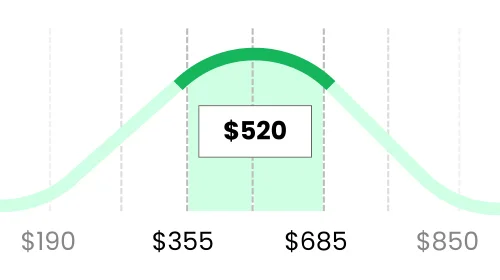$520
National average fixed price

Looking for an accurate quote for your location?

Discover how we calculate average moving company costs and select top-rated providers, ensuring you get the most accurate and reliable estimates.
Home » Cost Calculators » Moving Cost
Moving can be both an exciting and daunting experience. Whether you’re relocating across town or across the country, the process involves numerous details that need to be carefully managed, and one of the biggest questions you’ll face is: How much does a moving company cost? In this guide, we’ll break down the factors that affect moving costs, provide average pricing, and share tips on how to make your move as smooth and affordable as possible.

Before diving into the specifics of moving costs, it’s important to understand why hiring a professional moving company is often worth the investment. Moving is a complex process that involves heavy lifting, meticulous planning, and sometimes unexpected challenges. Professional movers bring experience, efficiency, and the right equipment to handle your belongings with care, reducing the risk of damage or injury.
I remember when we moved from our first home to our current one. We initially thought about doing it all ourselves to save money. However, after considering the logistics, the heavy lifting involved, and the potential stress, we decided to hire professionals. It turned out to be one of the best decisions we made—the move was smooth, and we didn’t have to worry about a thing.
The cost of hiring a moving company can vary widely depending on several factors. Understanding these can help you budget more effectively and avoid surprises.
The distance between your current home and your new location is one of the most significant factors affecting the cost of your move.
Local Moves: If you’re moving within the same city or within a short distance (usually under 100 miles), you can expect to pay between $300 and $1,000. Local moves are typically charged by the hour, with rates ranging from $50 to $180 per hour depending on the number of movers and trucks required.
Long-Distance Moves: For moves across state lines or over long distances, the cost can range from $1,500 to $5,000 or more. Long-distance moves are usually priced based on the weight of your belongings and the distance traveled.
The more stuff you have, the more it will cost to move it. Movers will take into account the number of rooms, the volume of furniture, and the overall weight of your belongings.
Small Moves: If you’re moving from a one-bedroom apartment, expect to pay on the lower end of the scale. Costs typically range from $200 to $1,000 for a long-distance move.
Larger Moves: Moving a three-bedroom home or larger can cost significantly more, ranging from $2,000 to $7,000 or more for a long-distance move.
When you move can also impact the cost. Moving companies tend to be busier during peak seasons, such as summer, and at the beginning and end of the month. If you have flexibility, consider moving during the off-season or mid-month to potentially save on costs.
Peak Season: Moving during the summer months or around holidays can increase costs by 20% or more. For example, a local move that might cost $850 in the off-season could rise to $1,500 or more during peak times.
Off-Season: If you can plan your move during the fall or winter months, you might find more availability and better pricing. Off-season moves can be more affordable, with savings ranging from 10% to 30%.
Many moving companies offer additional services that can add to the overall cost of your move. These might include:
Packing Services: If you don’t have the time or energy to pack your belongings, professional packing services can be added. Costs for packing services can range from $200 to $900 depending on the size of your home.
Storage: If your new home isn’t ready right away, you may need to store your belongings temporarily. Storage fees can range from $50 to $300 per month depending on the size of the storage unit and the length of time needed.
Specialty Items: Moving items like pianos, artwork, or large appliances may require special handling and equipment, which can add to the cost. Specialty item moving can cost an additional $100 to $1,000 depending on the item and the distance.

So, what should you expect to pay for your move? Here’s a general breakdown:
For a local move within the same city or region, costs typically range from $250 to $1,800. This price includes the hourly rate for movers, the number of movers required, and any additional services such as packing or specialty items.
For a long-distance move, expect to pay between $1,500 and $5,000 or more. This price is based on the weight of your belongings, the distance of the move, and any additional services required.
If you’re moving internationally, costs can vary widely depending on the destination, shipping method, and customs fees. International moves can range from $5,000 to $15,000 or more.
Label your boxes clearly with room names and fragile items to save time during unloading, which can help reduce hourly moving costs.
Moving doesn’t have to drain your bank account. Here are some tips to help you save money on your move:
One of the simplest ways to reduce moving costs is to declutter your home before the move. The less you have to move, the less it will cost. Consider donating, selling, or recycling items you no longer need.
I remember our last move—after sorting through years of accumulated stuff, we ended up donating several boxes of clothes and furniture. Not only did it feel good to declutter, but it also made the move more affordable.
Don’t settle for the first moving company you find. Get quotes from at least three different companies to compare prices and services. This will give you a better idea of the market rate and help you find the best deal.
If you’re looking to cut costs, consider packing your belongings yourself. While it’s time-consuming, it can save you hundreds of dollars. Just be sure to use high-quality packing materials to protect your items during the move.
As mentioned earlier, moving during the off-season can save you a significant amount of money. If you have flexibility in your moving dates, aim for a mid-week, mid-month move during the fall or winter.
Some moving companies offer discounts for certain groups, such as military personnel, students, or seniors. Be sure to ask if any discounts are available when getting your quote.

Selecting the right moving company is crucial for a smooth move. Here’s what to consider when making your choice:
Look for moving companies with positive reviews and ask for references from previous customers. This can give you an idea of their reliability and the quality of their services.
Make sure the moving company is licensed and insured. For interstate moves, check that the company is registered with the Federal Motor Carrier Safety Administration (FMCSA) and has a valid USDOT number.
Always get a written estimate before hiring a moving company. The estimate should outline all costs, including any additional fees for packing, storage, or specialty items. Be wary of companies that offer a significantly lower price than others—it could be a red flag.
Find out how long the moving company has been in business and if they have experience with moves similar to yours. An experienced company is more likely to handle your belongings with care and navigate any challenges that arise during the move.
Before hiring a cleaning service, ask for a detailed estimate that outlines the tasks included in the cleaning and any additional fees. This ensures you know exactly what you’re paying for and helps avoid any surprises on your bill.



Absolutely. While moving costs can add up, the peace of mind and convenience of hiring a professional moving company are well worth the investment. Professional movers take the stress out of moving, allowing you to focus on settling into your new home.
From my own experience, I’ve found that the right moving company can make all the difference. The move to our current home was seamless, thanks to a team of experienced movers who handled everything with care. It was worth every penny.
If you’re planning a move, take the time to research your options, compare quotes, and choose a company that fits your needs and budget. With the right preparation and the right team, your move can be a smooth and stress-free experience.
The cost of hiring a moving company can vary widely depending on the distance of the move, the size of your home, and any additional services you need. For a local move, you can expect to pay between $200 and $1,500. Long-distance moves typically range from $1,500 to $5,000 or more.
Several factors can influence the cost of your move, including the distance of the move, the size and weight of your belongings, the time of year, and any additional services such as packing, storage, or moving specialty items like pianos.
To save money on your move, consider decluttering before you move, packing your own belongings, and scheduling your move during the off-season. Additionally, getting multiple quotes from different moving companies can help you find the best price.
A local move typically involves moving within the same city or region, usually under 100 miles, and is charged by the hour. A long-distance move involves greater distances, often across state lines, and is usually charged based on the weight of your belongings and the distance traveled.
Yes, some moving companies may charge additional fees for things like stairs, long carry distances, or disassembling and reassembling furniture. It’s important to ask for a detailed estimate upfront to avoid any surprises on your final bill.
It’s best to book your moving company at least 6-8 weeks in advance, especially if you’re moving during peak season (summer months). Early booking helps ensure you get the date you want and can sometimes secure better rates.
Tipping is not required, but it’s a nice way to show appreciation for the movers’ hard work. A good rule of thumb is to tip $20-$40 per mover for a local move and $40-$100 per mover for a long-distance move, depending on the complexity and length of the move.
When choosing a moving company, check their credentials, such as licensing and insurance. Read customer reviews, ask for references, and get a detailed, written estimate. It’s also wise to verify that the company has experience with moves similar to yours.
Yes, but you should inform the moving company in advance if you have specialty items. Some companies have specific expertise in handling fragile or valuable items and may charge extra for these services. Ensure the company has the right equipment and experience to handle your specialty items safely.
Moving insurance is recommended to protect your belongings during the move. Standard coverage, known as Released Value Protection, is usually included but offers minimal coverage. Full Value Protection is more comprehensive and covers the repair or replacement of any items damaged or lost during the move, but it comes at an additional cost.
No results available
Reset© 2024 All Rights Reserved
Thank you! We’ve received your request and are working on finding you the best deals in your area. We’ll connect you with top-rated local businesses shortly!